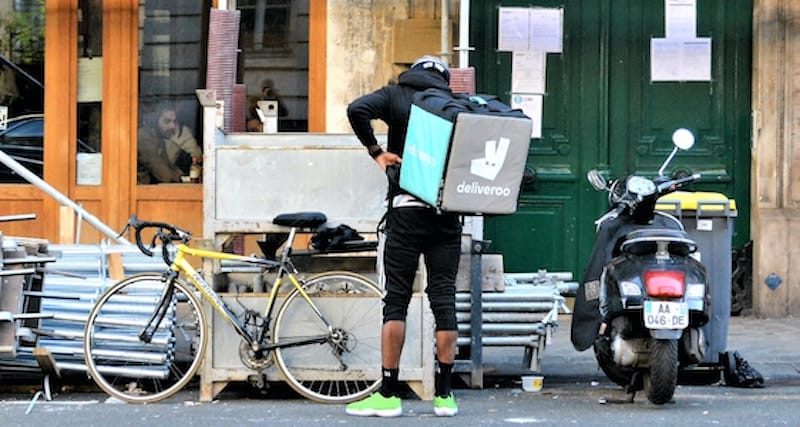Oxford Uni PPE grad Joshua Masson explores the UKSC’s recent Deliveroo judgment
 The UKSC recently handed down a decision that marks the end of a 7-year struggle for the rights of Deliveroo drivers, and gig workers in general. The court unanimously decided that the drivers in question were not employees of Deliveroo, and therefore would not be afforded many of the privileges that come with that status. It also bars the union from trade union recognition by the CAC, as worker status is the gateway to the recognition of an application.
The UKSC recently handed down a decision that marks the end of a 7-year struggle for the rights of Deliveroo drivers, and gig workers in general. The court unanimously decided that the drivers in question were not employees of Deliveroo, and therefore would not be afforded many of the privileges that come with that status. It also bars the union from trade union recognition by the CAC, as worker status is the gateway to the recognition of an application.
The case was very much a ‘Hail Mary’, resting on a breach of ECHR article 11, as opposed to a common or statutory law principle. The loss is therefore simultaneously disappointing, understandable, and unsurprising. To clarify, Deliveroo workers are still allowed to form a union, or join the Deliveroo-affiliated GMB, but this decision renders both materially useless. Crucially, the lack of employee status means that Deliveroo are not compelled to engage in collective bargaining, although it is by no means restricted.
There’s a lot to unpack with regards to the arguments made, largely due to the complex intersection between the ECHR and UK statute. The pertinent section of Article 11 states the following:
“1. Everyone has the right to freedom of peaceful assembly and to freedom of association with others, including the right to form and to join trade unions for the protection of his interests.”
- No restrictions shall be placed on the exercise of these rights other than such as are prescribed by law and are necessary.”
The IWGB (Independent Workers’ Union of Great Britain), who represented the aggrieved group of Deliveroo workers, argued that the ECHR definition of a ‘worker’ should correspond to the UK classification of ‘employee’, and that to hold otherwise was a breach of the aforementioned Article. Furthermore, they argued that the rights conferred by the above article included mandatory engagement in collective bargaining.
When incorporating documents such as the ECHR into UK statute, there is no need for direct transposition of the legislation; there is no mandatory legislative harmonisation, and states have large amounts of discretion in implementation, provided that they achieve the broad aim prescribed. The only mandate is that the domestic legislation concerned must be compatible with the ECHR, as required by s.3 Human Rights Act 1998. This presents an insurmountable obstacle for the argument that the intention of the ECHR was to both integrate the EU ‘worker’ definition and collective bargaining rights; the text clearly does no such thing, and the UK government is free to implement the broad aim of the legislation however it sees fit. The UK implementing legislation is by no means ‘incompatible’ with the ECHR. For this reason, the court very quickly dismissed these arguments and moved on to whether Deliveroo riders, in the same way as Uber drivers were in 2021, could be shoehorned into the category of ‘employee’.
A categorisation of ‘employee’ hinges on whether the relationship between the parties is akin to that of an employer-employee, or business-independent contractor. One of the key mistakes made in popular journalism, such as Callum Cant’s recent article in the Guardian, is asserting that the substitution clause in the riders’ agreement with Deliveroo was the only grounds for their self-employed status. This is not the case.
The clause in question gave riders licence to allow others to complete their assigned deliveries in their stead. There were no limitations on the number of jobs they could subcontract out, nor any limitations on who they could subcontract them to, or even on whether they could profit from such. Naturally, this is not an opportunity that would be afforded to employees in most employer-employee relationships.
Want to write for the Legal Cheek Journal?
Find out moreHowever, there are several other key features to the employer-employee relationship, none of which are replicated in the agreements between Deliveroo and their riders; the ability to do no work whatsoever, a lack of specific hours, a lack of specific location, a lack of determinate duration and continuity, no mandate of availability, no provided equipment, no periodic payment, an ability to simultaneously work for competitors, no entitlement to rest or holidays, no restriction on rest or holidays, no reimbursement for travel cost, and no insurance. Given this extensive list, it is difficult to find any way in which a Deliveroo rider fits the label ‘employee’, as they are wholly autonomous. In fact, it largely seems that they are the ones in the driving seat, both physically and figuratively speaking. They control when, where and how they work, for how long, and for whom, much like an individual who is self-employed.
It is also not a “loophole in employment law” as characterised by Cant. It is no accident and exists for a reason. We live in a society in which we assume that full workers’ rights come automatically for doing work. However, in truth, rights are perpetually murky because they are often a double-edged sword; they are not unconditional. When riders were asked in a survey what they liked most about riding for Deliveroo, 80% chose the option of “Flexible Work”. This is problematic as rights correlate with obligations, and clearly obligations are precisely what many Deliveroo riders seek to avoid; it would be counter-intuitive and unfair to suggest that Deliveroo riders should be given the full protection afforded to ‘true’ employees without submitting to the same restrictions of set hours, quotas, non-compete clauses, determinate holiday, etc. The rights of workers, and the security they provide, derive from the similar provision of security for their employers.
Given that the UKSC unanimously returned the opposite decision on the similar 2021 Uber case, a natural follow-up query might be: “what’s the difference between Uber drivers and Deliveroo riders?” There is no ‘bright line rule’ in distinguishing between employees and independent contractors, and it is all a question of degree; the UKSC clearly felt that Deliveroo riders were afforded a higher degree of flexibility than Uber drivers to the extent that the employment tie between the parties was dissipated.
This is entirely cogent, considering the previously discussed substitution clause (which Uber drivers do not have) and the higher proportion of Uber drivers working for Uber full-time (20% of drivers work full-time compared to 4% of riders). Clearly, the tie between most Deliveroo drivers and Deliveroo is not as close as that between Uber drivers and Uber.
It is also worth keeping in mind that a designation of ‘self-employed’ is a cumulative process; there are several features of Uber drivers’ relationship with Uber that do not resemble an employment relationship which Deliveroo riders compounded with more. The non-resemblance between Uber driving and a traditional position of employment is precisely why the case went to the Supreme Court in the first place. The differences are the ‘straws that broke the camel’s back’, with the camel’s back being an employer-employee relationship. There is nothing about the arrangement between Deliveroo and their riders that resembles an employment position beyond one party assigning the other a task and remunerating them for it, whilst for Uber drivers that are at least a few features that resemble ‘true’ employment.
Despite the workers’ grievances, the decision was advantageous for Deliveroo, whose stock price rose by 9%, and who publicly stated: “this is a positive judgment for Deliveroo riders, who value the flexibility that self-employed work offers”. There is something vaguely absurd about Deliveroo claiming that the riders’ loss was a ‘win for riders’, but they do have a valuable point: the riders represented by IWGB represented a portion of riders nationwide; for another set of riders, Deliveroo is a ‘side-gig’ that they do precisely because it is not entrapped by the relentless red tape and rigidity of full-on employment.
The IWGB do legitimately posit a grievance that “flexibility…is no reason to strip workers of basic entitlements like fair pay and collective bargaining rights” and that Deliveroo are merely leveraging such to “legitimise their exploitative business model”. As Cant rightly points out, there are several unjustifiable elements to Deliveroo’s treatment of their riders; they can pay riders as little as £2 an hour, necessitate 70+ hour working weeks, and expose riders to health and safety risks. However, Deliveroo’s treatment of its workforce does not change the labour relation between the two.
The academic reaction has been both disappointed but unsurprised: Alan Bogg, Professor of Labour Law at Bristol University said “the Deliveroo outcome is bitterly disappointing. Where a legal test results in the exclusion of the most precarious workers from Schedule A1, there is a serious problem”. Virginia Mantouvalou, Professor of Human Rights & Labour Law at University College, London, added: “No better way to illustrate structural injustice at work. People in secure, standard employment contracts enjoy many rights which people in precarious work do not have. A sad day for labour rights of precarious workers.”
Both comments are spot on; it is entirely arbitrary for substantive protections to be denied on a technicality. However, shoehorning Deliveroo riders in with ‘true’ employees is not a satisfactory solution. This may come by way of legislation, but a far easier and more practical solution would be for Deliveroo to reorganise its workforce. It could retain a section of workers (presumably the ones who essentially work as riders full-time anyway) as employees. It could then have a separate contract for ‘floating’ riders who can work as they please. This ensures that riders who need both job security and effective union representation have access to such, without compromising on the flexibility that Deliveroo and a section of their riders currently enjoy. Moreover, the power of any resultant union would be curtailed by the continual presence of the contracted workers, so Deliveroo would never need to worry about a potential union strong-arm. There is something deeply unsettling about the most at-risk workers having the thinnest protections, and it is in urgent need of a remedy.
Joshua Masson is a PPE graduate from the University of Oxford. He has completed the GDL and is currently studying for the SQE.
 (
( (
(